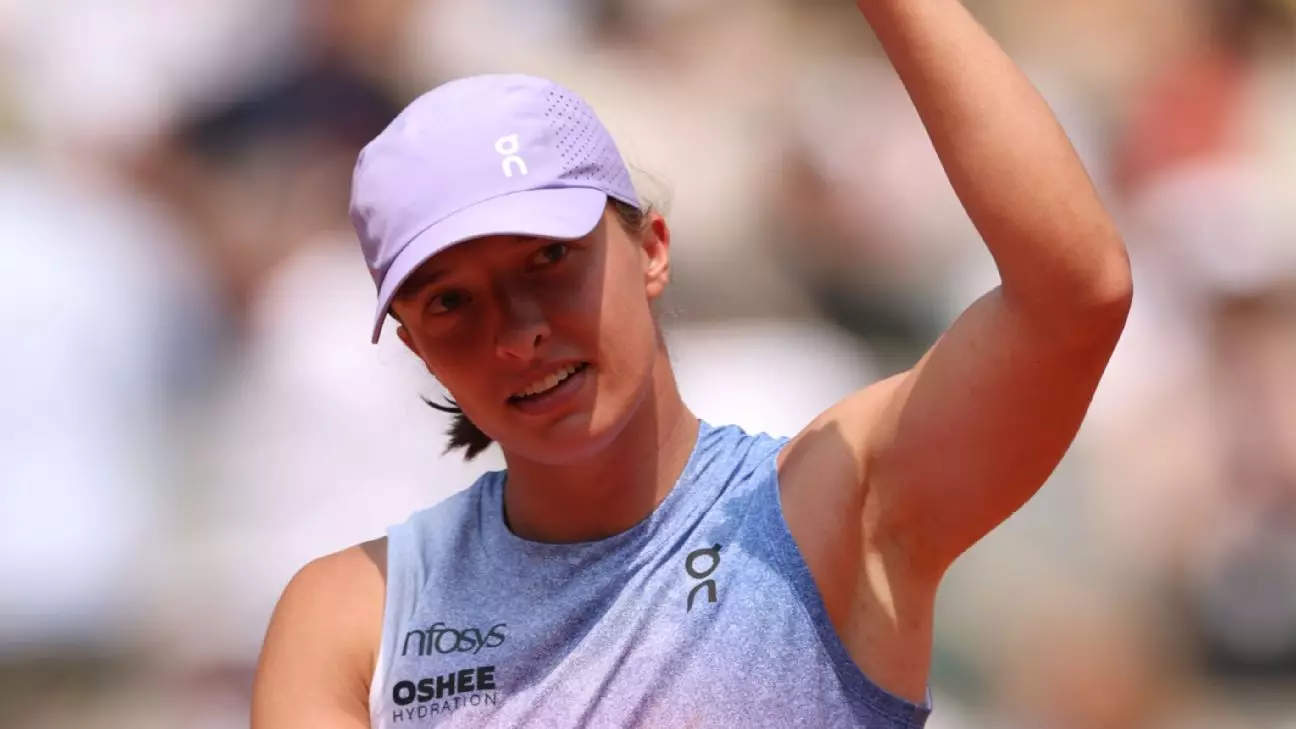Iga Swiatek has solidified her status as a powerhouse in women’s tennis, and her performance at Roland-Garros this year has further cemented that reputation. With her latest victory over Elina Svitolina, Swiatek not only recorded her 26th consecutive win at this prestigious tournament but also positioned herself for a thrilling semifinal showdown against top-seeded Aryna Sabalenka. Swiatek’s journey is one of resilience and determination; despite having endured a dip in form in recent months, she has stepped onto the Parisian clay with the poise of a champion.
The first set of the match against Svitolina was a masterclass in control, with Swiatek showcasing her trademark aggressive style, cruising to a 6-1 win. However, the Ukrainian competitor, seeded 13th, put up a stronger resistance in the second set, pushing Swiatek to demonstrate her mental fortitude. It’s easy to forget that even champions can have moments of vulnerability. Swiatek’s brief lapses, marked by uncharacteristic errors, serve as a reminder that the path to greatness is riddled with obstacles. Nevertheless, she rebounded swiftly, reclaiming her dominance with powerful shots that left her opponent reeling. As she sealed the match with an unreturnable ace, one could see in her face a fierce determination to reclaim her place at the top.
Aryna Sabalenka: Finding Strength in Adversity
On the other side of the draw, Aryna Sabalenka has also navigated her own set of challenges on her path to the semifinals. Her recent encounter with Zheng Qinwen revealed the kind of tenacity that defines great athletes. Sabalenka won in straight sets, but the scoreline of 7-6 (3), 6-3 hardly tells the full story. From the outset, Zheng came out firing, even securing an early break. However, what sets Sabalenka apart is her ability to rise to the occasion during critical moments. She expertly capitalized on Zheng’s inconsistencies in serve, showcasing her skill in transforming pressure into opportunity.
Sabalenka’s perspective on her recent loss to Zheng in Rome adds another layer to her narrative. Instead of succumbing to frustration, she saw that defeat as a catalyst for improvement. “I was actually glad I lost that match,” she reflected, which is a profound sentiment for someone who occupies the upper echelons of the sport. It speaks volumes about her mental approach—not just to winning, but also to the lessons that come from setbacks. Her readiness to battle in the quarterfinal was evident, indicating a shift in mentality that could be pivotal heading into her semifinal match against Swiatek.
The Clash of Titans
The forthcoming clash between Swiatek and Sabalenka is shaping up to be an epic encounter. Both players possess strong serves, exceptional groundstrokes, and a competitive fire that could set the court alight. With Swiatek striving to extend her legacy and reclaim a title she last held a year ago, and Sabalenka eager to capture her first French Open championship, the stakes couldn’t be higher. Their respective journeys—one marked by soaring highs and the other by a recent resurgence—have set the stage for a match that promises intensity, drama, and tactical brilliance.
As the countdown to the semifinals begins, fans and analysts alike are left speculating about the strategies each player might deploy. Will Swiatek’s ability to dictate play prevail against Sabalenka’s power and explosiveness? Or will Sabalenka leverage her recent form to outlast the reigning champion in a test of endurance and will? What is undeniable is that this match transcends mere sport; it is a microcosm of the human spirit’s unyielding drive toward greatness, resilience, and ultimately, triumph. As these two athletes prepare to collide, the world of tennis will undoubtedly be captivated by a spectacle that embodies everything the sport stands for.

